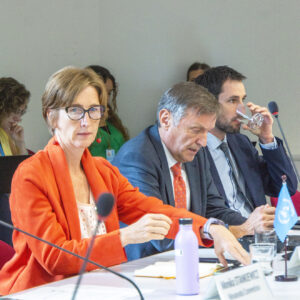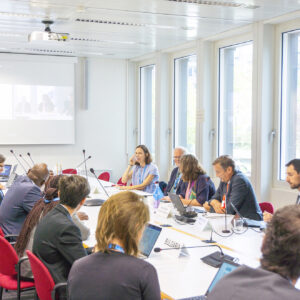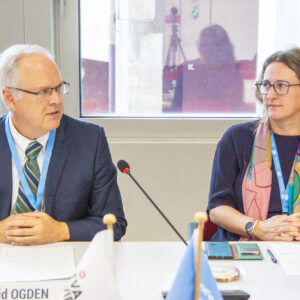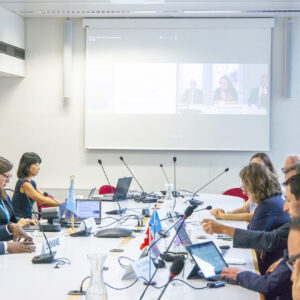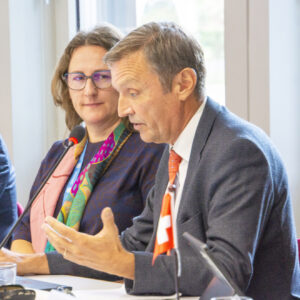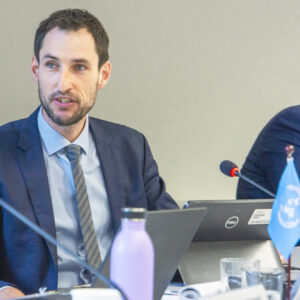Event Conference
Chemicals and Waste Negotiations Briefing

13 Sep 2022
10:00–12:00
Venue: International Environment House I, Room 3 & Online | Webex
Organization: Geneva Environment Network, UNEP Chemicals and Health Branch, Basel, Rotterdam and Stockholm Conventions, Minamata Convention on Mercury, Strategic Approach to International Chemicals Management
This briefing, organized within the framework of the Geneva Environment Network, provided an overview of the status of the negotiations related to chemicals and waste and upcoming important conferences.
About this Session
This Chemicals and Waste briefing, organized within the framework of the Geneva Environment Network, provided an overview of the work and key activities to advance the sound management of chemicals and waste globally. It also presented the latest information on the important conferences scheduled in the second half of 2022 and in 2023.
- 4th meeting of the Intersessional Process considering the Strategic Approach and sound management of chemicals and waste beyond 2020 | 29 August to 2 September 2022, Bucharest, Romania, and 2023
- 1st Session of the Open Ended Working Group (OEWG1) of the Science-Policy Panel to contribute further to the sound management of chemicals and waste and to prevent pollution | Nairobi and online, October 2022 and 2023
- 16th Meeting of the COP to the Basel Convention, the 11th meeting of the COP to the Rotterdam Convention and the 11th Meeting of the COP to the Stockholm Convention (BRS COPs) | Geneva, May 2023, as well as subsidiary body meetings leading up to the BRS COPs
- 5th Session of the International Conference on Chemicals Management (ICCM5) | Bonn, Germany, September 2023
- 5th Meeting of the Conference of the Parties to the Minamata Convention on Mercury | Geneva, October-November 2023
Speakers
By order of intervention.

Kevin HELPS
Principal Officer, Science-Policy Panel on Chemicals, Waste and Prevention of Pollution, UNEP

Michel TSCHIRREN
Waste and Chemicals Focal Point of the Global Affairs Section, Swiss Federal Office for the Environment
Summary
To be continued.
Welcome and Introduction
Monika STANKIEWICZ | Executive Secretary, Minamata Convention on Mercury
On the Minamata Convention, Science and Human Rights
The Minamata Convention turned 5 on 15 August 2022, and it was an occasion to remember that the science is needed in nearly all aspects of the Convention.
- In the 15th International Conference on Mercury as a Global Pollutant in July, issues such as linkages between the climate change and mercury pollution, artisanal and small scale gold mining, and the effectiveness valuation of the Minamata Convention Global Mercury Transport and Mercury in Southern Hemisphere were tackled. 4 scientific papers relevant to our work will be published, which the Convention will help make widely known.
- The newly established open-ended scientific group tasked to support the first evaluation of the effectiveness of the Convention is another example. The group is working with unprecedented transparency and inclusiveness: it is open to one member from each party, in addition to the Convention’s roster of experts nominated by countries and organizations. Initiated by the Secretariat, the roster currently consists of some 70 experts who can follow the work and can be called upon to provide input.
- Two studies being prepared and finalized with funding from Sweden: one on ecosystem services and mercury, and one on the socioeconomic impact of mercury pollution on fisheries and livelihoods. The studies are a follow-up to the COP-4 decision on international cooperation, which for the first time recognised the importance of addressing mercury pollution in connection with the global loss of biodiversity.
- One of the outcomes of the CBD open-ended working group on the post-2020 framework in June 2022 is a new reference to mercury pollution and other heavy metals added to the first draft of the framework for further negotiations. This reference if it remains in the final text will naturally allow the connections between the two Conventions to be stronger and would allow for more integration.
Mercury and Human Rights
- The latest annual thematic report by the UN Special Rapporteur on toxics and human rights, Marcos Orellana, was dedicated to the harms and risks for human rights of the use of mercury in small scale gold mining, where it is used to extract gold from ore causing substantial emissions to the environment globally. It will be presented to the 51st session of the Human Rights Council on 20 September, 15:00 CEST, and followed by
- In most small-scale gold mining locations where mercury is used, the human rights for miners, their families and communities, and indigenous people and traditional landowners are increasingly compromised by mercury contamination.
Geneva Toxic Free Talks
- In parallel to HRC51, the Geneva Toxic Free Talks will hold various sessions, including a session on “The Right Not to be Exposed, a Contribution to a Toxic Free Planet” on 21 September, followed by a reception to celebrate the 25 years of the mandate of toxics and human rights. → More information available
Monika MACDEVETTE | Head, Chemicals and Health Branch, UNEP
UNEP has a four-year medium-term strategy operationalized through two successive biennial programmes of work.
- Focus areas. Two UNEA-5 resolutions in March 2022, are particularly important to the Chemicals and Health Branch: resolution 5/7, the sound management of chemicals and waste, and resolution 5/8, the science policy panel to contribute further to the sound management of chemicals and waste, and to prevent pollution.
- Other UNEA resolutions that draw on the branch’s expertise to ensure a comprehensive and integrated contribution to delivering UNEP’s overall mandate and ensuring the issues of chemicals and waste are considered across all of UNEP’s work.
- The Nairobi and Osaka teams’ work are also to be highlighted, particularly on air pollution, sustainable mobility and e-vehicles, n waste management and waste technologies, especially in the context of circularity from e-waste to lead-acid batteries and plastic waste management.
- Critical as well to our work is the link between environmental health and human well-being, particularly through the IOMC interagency partnership with key partners such as WHO. We also work on antimicrobial resistance or AMR.
- As the work of the branch is increasingly regarded as integral to the division and unit’s work on circularity, engaging with industry and delivering our work in a country context has taken on a higher profile in delivering our global work in a national context and with relevance to keep high impact in sectors.
UNEP’s medium term strategy for 2022-2025 is well underway, including with the revised delivery model, aligning the delivery to be more strongly integrated with UN country teams and country priorities for UN intervention and support.
We cannot succeed without partnerships. These include engagement with governments, for whom we’re deeply grateful for the continued financial and collegial support, and for the guidance in implementing the resolutions that are given to us.
David OGDEN | Chief, Governance Branch, Basel, Rotterdam and Stockholm Conventions
A lot has changed over the 33 years in this business. In 1989, the life expectancy globally was 60 years old, and in 2022, it’s 70 years. People are living longer, but as you do, it extends the period in which you can acquire cancer as it often takes many years to develop. With aging populations, you have more opportunity for toxics to transfer from the environment — from food, water, and other sources — to collect in your body over time and create these toxic effects.
That is why we’re here to try to make sure that people can live longer, healthier lives, and still benefit from these chemicals. These are very valuable products, either as the chemical themselves, an alternative chemical, or even a non-chemical alternative.
Since 1989, most of the MEAs were negotiated, adopted, and entered into force, and so they play a great role in this global regime to manage chemicals and waste, alongside other international organizations and national bodies. They are key into developing the science to understand the risks of these chemicals, what alternatives could be, how we can prevent exposures that could lead to cancer.
From being very small in an international sense, now it’s huge. We’ve learned that international cooperation is great for preventing pollutions that cross boundaries, but it’s also great for sharing science and know-how. We share and everyone benefits. Lives are really being saved because of the work we’re doing.
Basel entered into force in early 1990s, and Stockholm and Rotterdam around 200. We had synergies when we brought the three conventions together in 2012, which I think has been a big success. More recently, our work on plastics and e-waste is cutting edge stuff I’m proud to be part of BRS and proud to be proud of this this bigger community.
I’ve never seen this level of attention on chemicals and waste my entire career and it’s really great to hear from all of you. It’s a lot of work, it’s very important and it will benefit many — environment and people.
Minamata Convention on Mercury
Claudia TEN HAVE | Senior Policy Coordination Officer, Minamata Convention on Mercury
The Convention is supporting various international processes: IP4, ICMGP 2022, post-2020 global biodiversity framework, BRS Conventions, Stockholm+50, and work in the Human Rights Council.
With COP-5 taking place in Geneva from 30 October to 3 November 2023, here are some updates on the various workstreams.

- Annex A was amended at COP-4, where 8 mercury-added products were added to part I of Annex A so that the manufacture, import and export will not be allowed after 2025. Provisions for dental amalgam were also added for part II of Annex A.
- The Expert Group on Mercury Releases is developing draft guidance on best available techniques and best environmental practice (BAT/BEP) to control mercury releases to land and water from relevant sources. Draft guidance is expected to be open for comments between December 2022 and February 2023.
- The Expert Group on Mercury Waste Thresholds is working to propose the following towards COP-5: thresholds for waste contaminated with mercury or mercury compounds; and guidance document on testing the leaching of mercury from mine tailings.
- An Open-Ended Scientific Group (OESG) to develop scientific reports on mercury monitoring and emissions/releases was established in COP-4. The OESG will develop 3 plans by COP-5.
- A second review of the financial mechanism will be drafted.
- Paying specific attention to needs of populations in vulnerable situations, COP-4 decision MC-4/10 on gender mainstreaming invited Parties to support the secretariat in its efforts to mainstream gender into all activities, including through the development of a gender action plan during the biennium 2022‒2023.
Minamata Online season 3 will feature webinars on implementation review and support and mercury science from October to December 2022.
Basel, Rotterdam and Stockholm Conventions
Andrea LECHNER | Programme Officer, Basel, Rotterdam and Stockholm Conventions
Outcomes of 2021/2022 BRS COPs
Towards 2023 COPs
Planning for COPs 2023
- 1-12 May 2023 in Geneva, Switzerland
- Preparatory meetings on 30 April 2023
- No high-level segment
- Tentative schedule of work to be considered by the BRS bureaux and finalized at the joint bureaux meeting in January 2023
- Invitation letters to be sent in November 2022
- Nomination deadline: 20 January 2023 (tbc)
- Regional preparatory meetings to be held in March 2023
BC subsidiary bodies:
- Implementation and Compliance Committee
- 15th meeting of the Implementation and Compliance Committee (ICC-15) (14-17 November 2022, Geneva, Switzerland)
- 8 specific submissions prioritized for consideration: Central African Republic, Cook Islands, Gabon, Liberia, Mauritania, Nauru, Syrian Arab Republic and Togo
- Open-ended Working Group
- 13th meeting of the Open-ended Working Group (OEWG-13) (21-23 February 2023, Geneva, Switzerland)
- Consider recommendations to improve the Strategic Framework
RC subsidiary bodies
- Chemical Review Committee
- 18th meeting of the Chemical Review Committee (CRC-18) (19-23 September 2022, Rome, Italy) (IISD summary)
- Compliance Committee
- 1st meeting of the Compliance Committee (CC-1) (16-18 November 2022, Geneva, Switzerland)
SC subsidiary bodies
- Persistent Organic Pollutants Review Committee
- 18th meeting of the Persistent Organic Pollutants Review Committee (POPRC-18) (26 to 30 September 2022, Rome, Italy)
BRS Conventions Schedule Overview


Strategic Approach to International Chemicals Management
Pierre QUIBLIER | Programme Officer, Chemicals and Health Branch, UNEP
Outcomes of the 4th meeting of the intersessional process considering the Strategic Approach and sound management of chemicals and waste beyond 2020
- IP4 took place in Bucharest, Romania from 29 August to 2 September 2022.
- Attended by almost 300 participants from Member States, industry, civil society, academia and youth.
Thematic Group 1: Vision, scope, principles & approaches, strategic objectives & targets
- Progress in discussion on all five strategic objectives.
- Identification of 28 high priority targets in support of the strategic objectives.
- Three new options proposed on the vision that have been welcomed as the basis for further work.
Thematic Group 2: Institutional arrangements, addressing issues of concern & linkages with the Science Policy Panel
- Progress on all institutional arrangements related issues including several functions of the governing body and the Bureau.
- Agreement reached linkages with future Science Policy Panel. But no consensus on how to invite the SPP to undertake work for the conference consideration.
Thematic Group 3: Implementing measures including capacity building & financial considerations
- Progress achieved with a number of brackets being removed and text agreed.
- Proposals for additional text included:
- From the Africa group on a global coordinated fee
- ICCA on a Capacity Building Platform
- Iran on the establishment of a databank
- Switzerland on a voluntary peer review mechanism
- ITUC on the creation of an international fund
IP4 is adjourned to February 2023, with the location yet to be determined. ICCM5 will convene in Bonn, Germany from 25 – 29 September 2023. A summary coverage of IP4 by the Earth Negotiations Bulletin is available on their website.
A survey on Emerging Policy Issues and other Issues of Concern aims to gather information about the ongoing work of stakeholders of the SAICM on emerging policy issues and other issues of concern. → More on the survey on emerging policy issues and other issues of concern
UNEP Chemicals and Health Branch, and the Special Programme
Monika MACDEVETTE | Head, Chemicals and Health Branch, UNEP
Through UNEP’s medium term strategy for 2022-2025, it will deliver its work through programs that tackle key aspect of chemicals and pollution action — a thematic subprogramme of UNEP alongside climate action and climate nature, under the triple planetary crisis. It will
- Maximize synergies across its existing and future streams of work on the sound management of chemicals, waste management, and pollution prevention and control, and amplify its impact by further strengthening partnerships (including industry, UN system and key partners);
- Focus on environment and health nexus; and
- Continue its work with countries and other MEAs.
Work Areas of the Chemicals and Health Branch
Issues of Concern under SAICM and Emerging Evidence indicating Risks

Chemicals in Plastics
- A video was presented raising awareness on chemicals and plastics. The video is available here.
Antimicrobial Resistance and Upcoming Developments
UNEP is part of the quadripartite alliance, alongside FAO, WHO and the World Organization for Animal Health. UNEP focuses on the environmental dimension of AMR (more on AMR and the environment in our update).
- Pollution plays a key role in AMR, impacted by biological and chemical pollutants whose main sources are pharmaceutical manufacturing processes and discharges.
- Use of antimicrobials, manure, and irrigation in intensive crop and animal production and waste often from healthcare facilities through poor sanitation, waste and surge and fecal waste and runoff from intensive animal and crop production, also contribute.
Upcoming developments include:
- The 3rd High-level Ministerial Conference on Antimicrobial Resistance (AMR) will take place in Muscat, Oman on 24-25 November 2022 to accelerate tackling AMR at the national, regional, and global levels and to enhance international cooperation. It will build on the success of the two previous High-level Ministerial Conferences held in the Netherlands in 2014 and 2019. The quadripartite alliance on AMR (FAO, OIE, WHO and UNEP) is providing support in the preparations.
- Launch of UNEP spotlight report on environmental dimensions of AMR at the Conference on 24 November.
- Other quadripartite efforts include:
- Working towards the establishment of the AMR Partnership Platform (during World Antimicrobial Awareness Week, 18-24 November 2022)
- Creation of technical groups on integrated surveillance and on the economic case
- First Global Summit for Regulators of Human and Animal Medicines (to take place in Geneva in March 2023)
- AMR Global Leaders Group information sessions
- Continued country support through AMR Multi-Partner Trust Fund projects
Special Programme

Science-Policy Panel on Chemicals, Waste and Pollution Prevention
Kevin HELPS | Principal Officer, Science-Policy Panel on Chemicals, Waste and Prevention of Pollution, UNEP
The first meeting of the ad hoc open-ended working group (OEWG 1) on a science-policy panel to contribute further to the sound management of chemicals and waste and to prevent pollution, convened pursuant to resolution 5/8 of the fifth session of the United Nations Environment Assembly will take place in two parts:
- Session 1 procedural, confirmed as one-day hybrid in Nairobi – 6 October 6 2022
- Session 2 substantive, in Bangkok week 30 January-3 February 2023
Following OEWG1
- Brazil has re-confirmed interest in OEWG 2 (provisional Oct 2023)
- Switzerland still interested in OEWG 3
- Leaves time for intergovernmental meeting in later half of 2024
Provisional timetable for OEWG1
- OEWG 1.1 –Nairobi (procedural)
- Establish the bureau (10 members)
- Appoint the chair / co-chairs
- Rules of procedure for OEWG (UNEA)
- Opening remarks / observations
- OEWG 1.2 –Bangkok (substantive)
- Options for scope
- Options for functions
- Options for rules of procedure of the panel
Q&A
Q: Has demand increased for the handling of batteries waste and how is this being enforced?
BRS: The quantities of transboundary movement of waste is being reported through national reporting. No specific research has been conducted on whether there has been an increase in waste batteries recently, but we have information that battery usage in various applications have increased. It is expected that waste has increased
Q: On Rotterdam Convention, is there a consideration that these PFOA and PFOS chemicals traded as part of articles?
BRS: PFOS and PFOA have been included, with the latter in just the most recent COP and will take into effect on 22 October 2022. In terms of the prior and informed consent procedure, this only relates to the chemical traded. The definition of articles that contains these chemicals is up to the countries to interpret and define, but an example is the chemicals contained in firefighting foam, which can be considered as articles or products depending on countries.
Closing Remarks
Michel TSCHIRREN | Waste and Chemicals Focal Point of the Global Affairs Section, Swiss Federal Office for the Environment
As highlighted during this briefing, a lot of important work is happening in the Chemicals and Waste Cluster and major progress was made and needs to continue.
Minamata Convention on Mercury
- 5 years of Minamata convention! Congratulations and thanks to the Secretariat for the hard work.
- Important step: Establishment of the Open-ended Scientific Committee for the Effectiveness Evaluation. The evaluation is foreseen by the convention text and to have a scientific foundation for it is crucial.
Basel, Rotterdam and Stockholm Conventions
- We took note that the BRS COPs can take place in Geneva. It is unexpected and Switzerland stands ready to support. Very positive that Geneva has the facility and the Chemicals and Waste cluster that will contribute to a successful BRS COP in May 2023.
- It will be an important meeting. For the Stockholm Convention, many chemicals are proposed for listing, including for example, UV-328, pertinent also in the Plastic INC context.
- We are looking forward to the chemicals in plastics reports by UNEP and BRS. They support the endeavor to use synergies and avoid duplication.
SAICM
- IP4.1 in Bucharest was a successful step towards the new framework after a challenging period for that process. Now important to keep up the work. From the discussion it seems key that:
- Objectives and targets must be ambitious and clear. Milestones and indicators need to be prepared as soon as possible.
- Industry needs to be involved. Accordingly a target or several targets to that end are important. Industry sector strategies and work on standards are proposed and are important for SMCW.
- The process can only be a success if the secretariat is well financed. To that end a voluntary scale of assessments should be adopted.
- Include in the new framework the possibility for Governments to request a review and expertise is another voluntary element that will strengthen the new framework. The voluntary peer review is another positive element of the current compilation document.
- Overall for the new framework. the IOMC organizations will play a very important role and again this is an opportunity for Geneva to facilitate coordination and action as many of those institutions are in Geneva.
Science and Policy Platform
- The SPP OEWG will soon establish its bureau and adopt its procedures and appoint the chair. That is crucial and should be rather straight forward and take place at the one day meeting in October.
- For the SPP OEWG it will be important to include from the start not just the environment community but also other sectors in particular the health side and therefore the WHO. This is rooted in the UNEA res and has been reiterated since then by many stakeholders. Also at the saicm IP4 in Bukarest. And also here today by Kevin.
- The SAICM stakeholders also included draft language in the compilation document about the relationship between the future framework – its conference and the future SPP. The international conference (of the framework) can consider the SPP assessments. Moreover it can invite the SPP to make reports on certain topics that are part of the framework. This approach makes a lot of sense and other Governing bodies will want to have that relation to the SPP.
Video
Photo Gallery
Previous Chemicals and Waste Briefings
28 April 2022 | 27 May 2021 | 16 December 2020 | 4 July 2019 | 12 June 2018 | 26 February 2018 | 22 June 2017 | 5 April 2017 | 30 November 2016 | 26 April 2016 | 26 January 2016 | 26 November 2015 | 8 September 2015
Documents
Links
- Basel Rotterdam Stockholm Conventions Secretariat
- Minamata Convention
- UNEP Chemicals and Waste
- SAICM Secretariat
- Chemicals and Waste Special Program On Institutional Strengthening
- Update on International Environmental Negotiations Agenda | Geneva Environment Network
- Previous Minamata Briefings: 2 March 2022 | 16 October 2021















